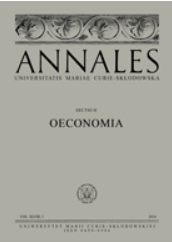Reactions of Family Businesses to the Initial Effects of Pandemic Shock
Reactions of Family Businesses to the Initial Effects of Pandemic Shock
Author(s): Ireneusz Samodulski, Agnieszka Gryglicka, Ada DomańskaSubject(s): Business Economy / Management, Health and medicine and law, Family and social welfare, Socio-Economic Research
Published by: Wydawnictwo Naukowe Uniwersytetu Marii Curie-Sklodowskiej
Keywords: Reactions of Family Businesses to the Initial Effects of Pandemic Shock;
Summary/Abstract: Theoretical background: A pandemic shock caused by the COVID-19 virus spread around the world, negatively affecting social and economic life in short term. Lockdowns, shutdowns and restrictions hit business performance extremely hard. Family businesses, a significant part of the business sector, are entities focusing generally on continuity, futurity and perseverance. Due to their multi-generational perspective, these firms are forced to react in the short term to deter negative impacts of the pandemic, including a drop in revenue and employment alongside doubtful prospects of survival. As an anti-crisis remedy, family businesses have drawn from their economic specificity to implement several intrinsic solutions aimed at mitigating the negative impacts of an economic downturn. Purpose of the article: The purpose of the paper is to isolate and determine which retrenchment, persevering and innovating responses to crisis were undertaken by family businesses as a remedy for the negative consequences of the pandemic shock. Research methods: The data collection was conducted in April and early May 2020. The final sample totalled 202 family businesses from Poland, and research questions were investigated by employing logit regression models. The dependent variables were various actions undertaken by family firm due to the crisis and independent variables were negative pandemic impact in businesses and self-estimated probability of their survival. Main findings: Family businesses facing a drop of employment decided to switch employees to non-paid holidays, reduce wages, switch employees to remote work and further tap liquid finance reserves. In addition, they started to liquidate less profitable areas if they expected a further employment drop. In the case of revenue decrease, these firms also reduced wages, suspended repayment of loans and leasing handling and extended payment terms of liabilities. The family firms investigated in this study that estimated a lower level of capital survivability also decided to liquidate less profitable areas of activity, sell less important production assets, suspend repayment of loans and leasing handling, extend payment terms of liabilities and suspend investment processes.
Journal: Annales Universitatis Mariae Curie-Skłodowska, Sectio H Oeconomia
- Issue Year: LVI/2022
- Issue No: 1
- Page Range: 37-59
- Page Count: 23
- Language: English

